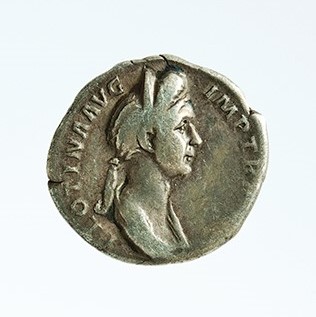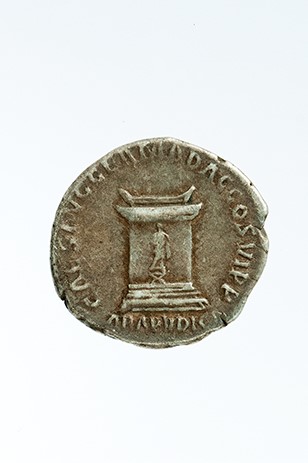Acquisition number: 1971.08
Obv.: Bust of Plotina r., draped; hair piled high in front, diademed, elaborately waved at back with long plait falling down neck. PLOTINA AVG(usta) IMP(eratoris) TRA[IANI].
Rev.: Altar of four steps, with horns at top left and right. On face of altar, Pudicitia, veiled and draped, standing front on curule chair (a chair of state used by consuls, praetors, and curule aediles). CAES(ar) AVG(ustus) GERMA(nicus) DAC(icus) CO(n)S(ul) VI P(ater) P(atriae). In exergue, ARA PVDIC(itiae).
Title: Denarius of Trajan - 1971.08
Acquisition number: 1971.08
Author or editor: Beryl Rawson
Culture or period: Roman Imperial
Date: AD 112
Material: Metal - Silver
Object type: Coins - Roman
Dimensions: 18mm (w)
Origin region or location: Italy
Origin city: Rome
Display case or on loan: 7
Keywords: Coin, denarius, Roman, Imperial, Trajan, Plotina, Pudicitia
Sear, D.R., Roman Coins and their Values 5 vols (London, Spink, 2000-2014) 3375; Mattingly, H.,Coins of the Roman Empire in the British Museum, 6 vols (London, 1965) 529 (pl. 18.15); Seaby, H.A., Roman Silver Coins (London, B.A. Seaby, 1967) 7; Robertson, A. Roman Imperial Coins in the Hunter Coin Cabinet, University of Glasgow 5 vols (Oxford: Oxford University Press, 1962-1982) II 69 no. 4 and pl. 17.
Breglia, L., Roman Imperial Coins: Their Art and Technique (New York, F.A. Praeger, 1968) p. 46 and pl.XXII; Hill, P.V., ‘Buildings and monuments of Rome on the coins of the Second Century (AD 96-192): Part 2’, The Numismatic Chronicle 145 (1985), 82-101. Noreña, C.F., ‘Hadrian's chastity’, Phoenix 61.3/4 (2007), 296-317.
1971.08
Denarius of Trajan
3.078 g. AD 112
Obv.: Bust of Plotina r., draped; hair piled high in front, diademed, elaborately waved at back with long plait falling down neck. PLOTINA AVG(usta) IMP(eratoris) TRA[IANI].
Rev.: Altar of four steps, with horns at top left and right. On face of altar, Pudicitia, veiled and draped, standing front on curule chair (a chair of state used by consuls, praetors, and curule aediles). CAES(ar) AVG(ustus) GERMA(nicus) DAC(icus) CO(n)S(ul) VI P(ater) P(atriae). In exergue, ARA PVDIC(itiae).
Plotina was the wife of the emperor Trajan. She and Trajan’s sister Marciana and his niece Matidia are similarly portrayed during his reign as symbols of virtue, modesty, even austerity. Just as Trajan declined the title of pater patriae at the beginning of his reign, Plotina declined that of ‘Augusta’ (Pliny Panegyricus 84). The first record of that title for her belongs to AD 105. Marciana probably received the title at the same time as Plotina — an extension of the increasing practice of the previous century to confer the title on an emperor’s wife and/or daughter. Both women wear the ‘architectural head-dresses’ characteristic of the period.
Pudicitia (Modesty, Womanly Virtue) was an appropriate personification for this reign, when Trajan was trying to present a more humble, less flamboyant image than that presented by some members of imperial families in the preceding century. The curule chair associated with Pudicitia on her altar (ara) gives an official association to the cult: the curule chair was an attribute of high magistrates.
On Trajan’s titles see 1965.07. The increasing accumulation of imperial titles sometimes overcrowded coin legends.
Plotina lived on after Trajan’s death until c. AD 122, and appeared on the coins of Hadrian (who was probably responsible for her deification after her death). Her coins are rare.
Sear, D.R., Roman Coins and their Values 5 vols (London, Spink, 2000-2014) 3375; Mattingly, H.,Coins of the Roman Empire in the British Museum, 6 vols (London, 1965) 529 (pl. 18.15); Seaby, H.A., Roman Silver Coins (London, B.A. Seaby, 1967) 7; Robertson, A. Roman Imperial Coins in the Hunter Coin Cabinet, University of Glasgow 5 vols (Oxford: Oxford University Press, 1962-1982) II 69 no. 4 and pl. 17.
Breglia, L., Roman Imperial Coins: Their Art and Technique (New York, F.A. Praeger, 1968) p. 46 and pl.XXII; Hill, P.V., ‘Buildings and monuments of Rome on the coins of the Second Century (AD 96-192): Part 2’, The Numismatic Chronicle 145 (1985), 82-101. Noreña, C.F., ‘Hadrian's chastity’, Phoenix 61.3/4 (2007), 296-317.

